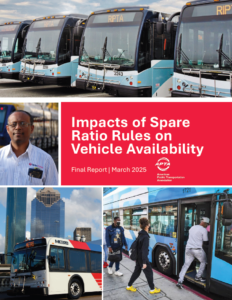Transit agencies find it increasingly difficult to meet the Federal Transit Administration’s (FTA) 20 percent spare ratio requirement. APTA commissioned a study to address the evolving challenges associated with the spare ratio requirement. A survey of 154 APTA transit agency members provided a national overview of the challenges agencies are facing. APTA selected six agencies for a more in-depth look at specific agency situations and lessons learned. The report provides a series of best practices for agencies as well as policies to consider to support transit agencies in maintaining their fleet needs.
The study, “Impact of Spare Ratio Rules on Vehicle Availability,” also found that:
- Contributing factors include an overall move to all-day and frequent bus service, maintenance staff shortages, delays in obtaining news parts, new technology, and aging fleets.
- In an APTA survey of public transit agency members, more than 41 percent reported encountering vehicle availability problems at least a few times per month.
- Seventy-four percent of agencies felt that changing the spare ratio policy would improve vehicle operations. Eighty-four percent advocated for an increase in the spare ratio.
The following policy considerations were developed based on the experiences of transit agencies nationwide and the challenges they have faced:
- Providing more flexibility in calculating fleet and spare vehicle needs
- Clarifying guidance around Useful Life Benchmarks
- Offering better technical support for fleet planning
- Supporting workforce development initiatives for maintenance personnel
- Clarifying policies regarding spare ratio requirements during transitions to zero-emission vehicles
- Enhancing support for fuel supply and infrastructure development




